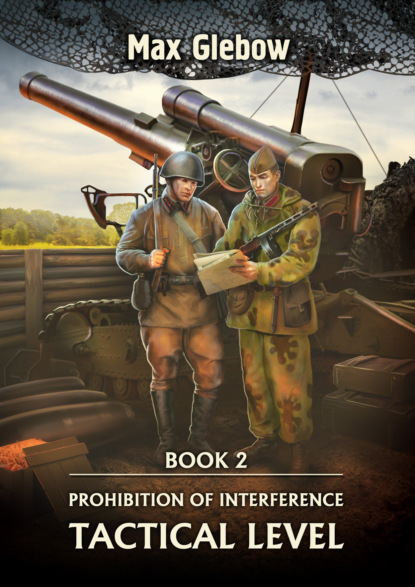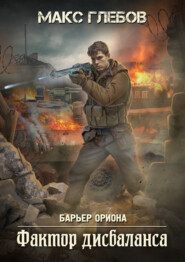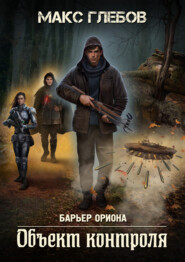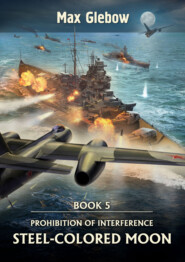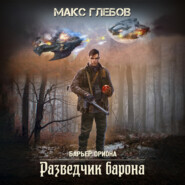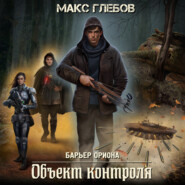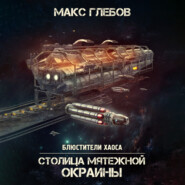По всем вопросам обращайтесь на: info@litportal.ru
(©) 2003-2024.
✖
Prohibition of Interference. Book 2. Tactical Level
Настройки чтения
Размер шрифта
Высота строк
Поля
“The commander of a separate reconnaissance company of the 300th Division, Captain Shcheglov, states that if Junior Lieutenant Nagulin corrects the fire, hits will follow quickly.”
“Is that so?” Sarcasm was clearly audible in the voice of the Army Commander. “And who is this Nagulin? A great artilleryman who went to serve in the intelligence service for some reason?”
“That's how I reacted when I heard about the plan, too,” the chief of staff shrugged. “But then… Anyway, just in case, I asked the Special Department what they had on this Nagulin.”
“And?” Feklenko was interested.
“He and Captain Shcheglov came to us from Lieutenant-General Muzychenko's Sixth Army; they broke out of the pocket as part of the staff column. There are no details, but it seems this Nagulin showed himself very well there. And, according to the officers of the Special Department, it was he who captured the Hauptmann by attacking the boat carrying the officer and by cutting off the guards.”
“Well, if he's so good, let the Captain write up a presentation to the award for him – he honestly deserves it. But that doesn't answer my question.”
“That's not all, Comrade Commander. A secret order came from the front's Special Department. I was introduced to it. The Junior Lieutenant, it turns out, is not so simple. Our Special Department officers were instructed to keep an eye on him, but not to touch him. It is specifically stated that Nagulin should not be hindered in his initiatives. Within reasonable limits, of course. He seems to have distinguished himself quite a bit there, near Uman. It was something that impressed even high NKVD officials. Many men from the Sixth Army arrived with the last reinforcements to the 300th Division. Major Gunko asked them some neat questions about Nagulin. Everyone claims that he is a great marksman, just phenomenal. And he hits with the same accuracy from any weapon, including anti-aircraft guns. They say Nagulin shot down several planes before their eyes.”
“Well, you can't believe all these stories unconditionally…” said Feklenko thoughtfully. “But it looks like he's really not an ordinary fighter. And I will not hide the fact that you, Vitaly Nikolayevich, have puzzled me quite a bit with this bridge for tanks. All right, Comrade Chief of Staff, prepare the order, I'll sign it. Let the scouts act, they will have howitzers of special power.”
Chapter 5
I slept the rest of the day off after returning to the division. Shcheglov and the rest of the raid participants were also able to rest, but it seems that I was the only one who managed to sleep for so long. Apparently, my comrades tried not to bother me, remembering my injury, even if it was necessary.
It was late in the evening when the Captain woke me up after all.
“Junior Lieutenant,” he said softly, touching my shoulder, “You and I are called to the division commander. Be ready in ten minutes.”
When we entered the staff dugout and Shcheglov reported our arrival, Colonel Kuznetsov nodded silently and pointed us to a bench by a large table, on which the maps were laid out.
“I don't know what your German was saying, but Army HQ got very nervous,” said the Colonel. “The Army Commander approved your initiative. I have received orders to give you every assistance in organizing a new reconnaissance raid, more profound than the previous one. Three divisions of B-4 howitzers of special power are involved in the operation. Tomorrow at dawn, go to the artillerymen to establish cooperation. You've been given a new type of radio transmitter from the army depot and an instructor to train your radio operators, Captain. You're going on a mission tomorrow night. By the morning I need a plan of the operation – the place of crossing the front line, the route of movement through the German rear, the time of communication sessions, in general, everything that is required in such cases. If you need divisional artillery assistance or demonstrative action in any area, indicate that, too. Any questions?”
“Negative,” Shcheglov replied, with a brief glance at me. “Permission to go prepare the operation plan, Comrade Colonel.”
“Go,”said the division commander, “I advise you to treat this case with the utmost care. You've made such a mess that if your raid turns out to be a flop…”
“We will approach the case with the utmost care!” the Captain answered clearly.
“Dismissed.”
* * *
In the end, I went alone to the artillerymen. Shcheglov was completely unnecessary there, and he had more than enough to do to organize the raid – in planning the operation we asked for so many things that Colonel Kuznetsov took off his cap and thoughtfully scratched the back of his head, as he read our suggestions, but, apparently, the order from the army headquarters was unambiguous, and Kuznetsov did not refuse us.
An artillery lieutenant met me and escorted me to Lieutenant Colonel Tsaitiuni. The commander of the artillery regiment listened to my report and grinned.
“Why didn't your captain come, Junior Lieutenant?” the Caucasian accent in the Lieutenant Colonel's speech was clearly audible, “I would have told him a lot of interesting things about artillery. He wants B-4, doesn't he? This is not a 45mm cannon, it cannot be rolled into position manually. Do you see what's happening to the weather? The ground is muddy. And I am ordered to get into position to fire on the Dnieper! That means forward to the front line. What if the Germans come forward? We'll all stay there, we won't even have time to pull the howitzers back from these positions.”
“Comrade Lieutenant Colonel, I can't discuss orders coming from the army headquarters – it's not my level,” I answered neutrally. “Captain Shcheglov is preparing a group for a raid behind enemy lines, so he could not come in person. And I'm the one who will be correcting your fire with the radio, that's why I'm here.”
“Have you ever worked as a spotter, Junior Lieutenant?”
“I haven't,” I answered honestly, “but I have theoretical training.”
“Well, then you'll correct us…”
“Comrade Lieutenant Colonel, I have very good eyesight and trained hearing. I am also good at math, which is why I was assigned this task. I can give targeting in rectangular coordinates with sufficient accuracy, but, there is another option. If you let me work directly with the gun crews, we can greatly increase the accuracy of fire and reduce the number of sighting shots.”
“How's that, Junior Lieutenant?”
“I myself can calculate sight, level, and deflection settings, as well as topographic range with adjustments for ballistic and meteorological conditions and derivation. Having in mind the required type of charge, of course.”
“So…" Tsaitiuni hemmed, "You know clever words, but you're talking obvious nonsense. How can you calculate all this from an observation post in close proximity to the target?”
“If I know the exact coordinates of each howitzer, I can. Moreover, if you let me see the tables of individual corrections for each howitzer, let me make excerpts from them, and check the internal condition of the barrels, the accuracy of firing will be even higher.”
“I don't believe it! This is just sickening nonsense, Junior Lieutenant! I don't know what you told your captain, and he told the division commander, and the division commander told the Army Commander, but if the operation is planned on the basis of this verbiage… I will not put the howitzers of special power under fire from German field artillery for the sake of these nonsense!”
“Comrade Lieutenant Colonel, allow me to make a little demonstration. A day ago I visited the German rear, and there our group discovered, among other things, one very promising dugout, which for all intents and purposes looked like a field ammunition or fuel depot. It was at night and we didn't get a good look at it, but I made a mark on the map and remembered the coordinates. If you let me work with the crew of one of the B-4s, I will calculate all the necessary data for firing and report to the gunners. You have a telephone connection to the front line, and we can have someone at the nearest regimental observation post to look in the right direction. The warehouse is eight and a half kilometers from the first line of German trenches, but if it stores ammunition or fuel, the result of the hit should be quite visible from the regimental observation post.”
The artillery regiment commander pondered my suggestion for about ten seconds, looking at me from his considerable height.
“Three shells, Junior Lieutenant,” he finally squeezed out irritably, taking the map out of his clipboard, “Where's the warehouse?”
* * *
The division commander, Senior Lieutenant Biryukov, escorted me to the howitzer position allocated by the Lieutenant Colonel to check my words. He looked skeptically at the visiting scout who tried to pretend to be an artilleryman.
“Comrade Senior Lieutenant, the gun is camouflaged and ready to fire,” the crew leader reported to Biryukov. “On your orders, we're finishing setting up a backup position 300 meters from here at the edge of the forest.”
“Staff Sergeant, assemble your crew. You are temporarily under the command of Junior Lieutenant Nagulin, for exactly three shots from your gun. I'll be there too, but I won't interfere. Do it!”
“Copy that!” Biryukov's subordinate turned to me, “Comrade Junior Lieutenant, B-4 howitzer commander Staff Sergeant Ilyin. What are the orders?”
“First of all, Staff Sergeant, show me your gun.”
It took me about ten minutes to go over the whole position, look in the barrel of the howitzer, look through the correction table, then I asked the Senior Lieutenant if the regiment had the latest weather data, and after that I went to pick out shells for firing.
As I approached the charges stacked in the crates under the canopy and began to take them out one by one, weighing them in my hands, the Sergeant and Senior Lieutenant looked at me with a sneer mingled with wariness.
“These, Comrade Staff Sergeant,” I put aside the selected charges.
My next target was actually high-explosive shells. When I approached them, the grin on the Lieutenant's face became a little more obvious – I was not distinguished by a powerful physique, and the shell weighed a hundred kilograms.
I bent down and lifted the projectile, shook it from side to side, rotated it several times along its axis, giving the computer a chance to assess the mass distribution and the suitability of the ammunition for accurate shooting. From the corner of my eye, I watched the grin slip off the Lieutenant's face, and the crew leader shook his head respectfully.
Two shells I rejected, and the three selected shells I put aside next to the charges.
I turned to the Staff Sergeant. “You will shoot in this exact sequence. Load it up!”
I gave the crew leader the data to set the sight, the deflection, and the level, and the gunners loaded the howitzer with rote movements, and the piston bolt clanked loudly, locking the barrel's channel.
“The gun is ready to fire!” reported Ilyin, having reeled off 20 meters of rope tied to the trigger handle.
“Is that so?” Sarcasm was clearly audible in the voice of the Army Commander. “And who is this Nagulin? A great artilleryman who went to serve in the intelligence service for some reason?”
“That's how I reacted when I heard about the plan, too,” the chief of staff shrugged. “But then… Anyway, just in case, I asked the Special Department what they had on this Nagulin.”
“And?” Feklenko was interested.
“He and Captain Shcheglov came to us from Lieutenant-General Muzychenko's Sixth Army; they broke out of the pocket as part of the staff column. There are no details, but it seems this Nagulin showed himself very well there. And, according to the officers of the Special Department, it was he who captured the Hauptmann by attacking the boat carrying the officer and by cutting off the guards.”
“Well, if he's so good, let the Captain write up a presentation to the award for him – he honestly deserves it. But that doesn't answer my question.”
“That's not all, Comrade Commander. A secret order came from the front's Special Department. I was introduced to it. The Junior Lieutenant, it turns out, is not so simple. Our Special Department officers were instructed to keep an eye on him, but not to touch him. It is specifically stated that Nagulin should not be hindered in his initiatives. Within reasonable limits, of course. He seems to have distinguished himself quite a bit there, near Uman. It was something that impressed even high NKVD officials. Many men from the Sixth Army arrived with the last reinforcements to the 300th Division. Major Gunko asked them some neat questions about Nagulin. Everyone claims that he is a great marksman, just phenomenal. And he hits with the same accuracy from any weapon, including anti-aircraft guns. They say Nagulin shot down several planes before their eyes.”
“Well, you can't believe all these stories unconditionally…” said Feklenko thoughtfully. “But it looks like he's really not an ordinary fighter. And I will not hide the fact that you, Vitaly Nikolayevich, have puzzled me quite a bit with this bridge for tanks. All right, Comrade Chief of Staff, prepare the order, I'll sign it. Let the scouts act, they will have howitzers of special power.”
Chapter 5
I slept the rest of the day off after returning to the division. Shcheglov and the rest of the raid participants were also able to rest, but it seems that I was the only one who managed to sleep for so long. Apparently, my comrades tried not to bother me, remembering my injury, even if it was necessary.
It was late in the evening when the Captain woke me up after all.
“Junior Lieutenant,” he said softly, touching my shoulder, “You and I are called to the division commander. Be ready in ten minutes.”
When we entered the staff dugout and Shcheglov reported our arrival, Colonel Kuznetsov nodded silently and pointed us to a bench by a large table, on which the maps were laid out.
“I don't know what your German was saying, but Army HQ got very nervous,” said the Colonel. “The Army Commander approved your initiative. I have received orders to give you every assistance in organizing a new reconnaissance raid, more profound than the previous one. Three divisions of B-4 howitzers of special power are involved in the operation. Tomorrow at dawn, go to the artillerymen to establish cooperation. You've been given a new type of radio transmitter from the army depot and an instructor to train your radio operators, Captain. You're going on a mission tomorrow night. By the morning I need a plan of the operation – the place of crossing the front line, the route of movement through the German rear, the time of communication sessions, in general, everything that is required in such cases. If you need divisional artillery assistance or demonstrative action in any area, indicate that, too. Any questions?”
“Negative,” Shcheglov replied, with a brief glance at me. “Permission to go prepare the operation plan, Comrade Colonel.”
“Go,”said the division commander, “I advise you to treat this case with the utmost care. You've made such a mess that if your raid turns out to be a flop…”
“We will approach the case with the utmost care!” the Captain answered clearly.
“Dismissed.”
* * *
In the end, I went alone to the artillerymen. Shcheglov was completely unnecessary there, and he had more than enough to do to organize the raid – in planning the operation we asked for so many things that Colonel Kuznetsov took off his cap and thoughtfully scratched the back of his head, as he read our suggestions, but, apparently, the order from the army headquarters was unambiguous, and Kuznetsov did not refuse us.
An artillery lieutenant met me and escorted me to Lieutenant Colonel Tsaitiuni. The commander of the artillery regiment listened to my report and grinned.
“Why didn't your captain come, Junior Lieutenant?” the Caucasian accent in the Lieutenant Colonel's speech was clearly audible, “I would have told him a lot of interesting things about artillery. He wants B-4, doesn't he? This is not a 45mm cannon, it cannot be rolled into position manually. Do you see what's happening to the weather? The ground is muddy. And I am ordered to get into position to fire on the Dnieper! That means forward to the front line. What if the Germans come forward? We'll all stay there, we won't even have time to pull the howitzers back from these positions.”
“Comrade Lieutenant Colonel, I can't discuss orders coming from the army headquarters – it's not my level,” I answered neutrally. “Captain Shcheglov is preparing a group for a raid behind enemy lines, so he could not come in person. And I'm the one who will be correcting your fire with the radio, that's why I'm here.”
“Have you ever worked as a spotter, Junior Lieutenant?”
“I haven't,” I answered honestly, “but I have theoretical training.”
“Well, then you'll correct us…”
“Comrade Lieutenant Colonel, I have very good eyesight and trained hearing. I am also good at math, which is why I was assigned this task. I can give targeting in rectangular coordinates with sufficient accuracy, but, there is another option. If you let me work directly with the gun crews, we can greatly increase the accuracy of fire and reduce the number of sighting shots.”
“How's that, Junior Lieutenant?”
“I myself can calculate sight, level, and deflection settings, as well as topographic range with adjustments for ballistic and meteorological conditions and derivation. Having in mind the required type of charge, of course.”
“So…" Tsaitiuni hemmed, "You know clever words, but you're talking obvious nonsense. How can you calculate all this from an observation post in close proximity to the target?”
“If I know the exact coordinates of each howitzer, I can. Moreover, if you let me see the tables of individual corrections for each howitzer, let me make excerpts from them, and check the internal condition of the barrels, the accuracy of firing will be even higher.”
“I don't believe it! This is just sickening nonsense, Junior Lieutenant! I don't know what you told your captain, and he told the division commander, and the division commander told the Army Commander, but if the operation is planned on the basis of this verbiage… I will not put the howitzers of special power under fire from German field artillery for the sake of these nonsense!”
“Comrade Lieutenant Colonel, allow me to make a little demonstration. A day ago I visited the German rear, and there our group discovered, among other things, one very promising dugout, which for all intents and purposes looked like a field ammunition or fuel depot. It was at night and we didn't get a good look at it, but I made a mark on the map and remembered the coordinates. If you let me work with the crew of one of the B-4s, I will calculate all the necessary data for firing and report to the gunners. You have a telephone connection to the front line, and we can have someone at the nearest regimental observation post to look in the right direction. The warehouse is eight and a half kilometers from the first line of German trenches, but if it stores ammunition or fuel, the result of the hit should be quite visible from the regimental observation post.”
The artillery regiment commander pondered my suggestion for about ten seconds, looking at me from his considerable height.
“Three shells, Junior Lieutenant,” he finally squeezed out irritably, taking the map out of his clipboard, “Where's the warehouse?”
* * *
The division commander, Senior Lieutenant Biryukov, escorted me to the howitzer position allocated by the Lieutenant Colonel to check my words. He looked skeptically at the visiting scout who tried to pretend to be an artilleryman.
“Comrade Senior Lieutenant, the gun is camouflaged and ready to fire,” the crew leader reported to Biryukov. “On your orders, we're finishing setting up a backup position 300 meters from here at the edge of the forest.”
“Staff Sergeant, assemble your crew. You are temporarily under the command of Junior Lieutenant Nagulin, for exactly three shots from your gun. I'll be there too, but I won't interfere. Do it!”
“Copy that!” Biryukov's subordinate turned to me, “Comrade Junior Lieutenant, B-4 howitzer commander Staff Sergeant Ilyin. What are the orders?”
“First of all, Staff Sergeant, show me your gun.”
It took me about ten minutes to go over the whole position, look in the barrel of the howitzer, look through the correction table, then I asked the Senior Lieutenant if the regiment had the latest weather data, and after that I went to pick out shells for firing.
As I approached the charges stacked in the crates under the canopy and began to take them out one by one, weighing them in my hands, the Sergeant and Senior Lieutenant looked at me with a sneer mingled with wariness.
“These, Comrade Staff Sergeant,” I put aside the selected charges.
My next target was actually high-explosive shells. When I approached them, the grin on the Lieutenant's face became a little more obvious – I was not distinguished by a powerful physique, and the shell weighed a hundred kilograms.
I bent down and lifted the projectile, shook it from side to side, rotated it several times along its axis, giving the computer a chance to assess the mass distribution and the suitability of the ammunition for accurate shooting. From the corner of my eye, I watched the grin slip off the Lieutenant's face, and the crew leader shook his head respectfully.
Two shells I rejected, and the three selected shells I put aside next to the charges.
I turned to the Staff Sergeant. “You will shoot in this exact sequence. Load it up!”
I gave the crew leader the data to set the sight, the deflection, and the level, and the gunners loaded the howitzer with rote movements, and the piston bolt clanked loudly, locking the barrel's channel.
“The gun is ready to fire!” reported Ilyin, having reeled off 20 meters of rope tied to the trigger handle.





